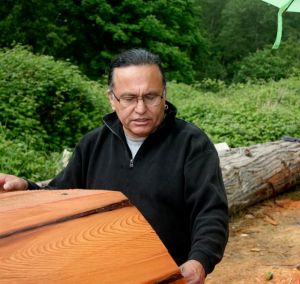Master carver Jewell Praying Wolf James, who selected, designed, and carved the healing totem pole that will be part of the National Library of Medicine’s Native Voices exhibition, opening October 6, is more than an artist of international standing. James is the head of the House of Tears Carvers and a long-time leader of the Lummi Indian Nation (http://www.lummi-nsn.org/website/index2.html). James also is a forceful advocate for worldwide environmental restoration and preservation.
 The Lummi people are the original inhabitants of Washington’s northernmost coast and southern British Columbia. Traditionally, the Lummi people’s livelihood depended on salmon fishing.
The Lummi people are the original inhabitants of Washington’s northernmost coast and southern British Columbia. Traditionally, the Lummi people’s livelihood depended on salmon fishing.
For many years as Fisheries Director for the Lummi Nation until the mid-1980s, Jewell James championed salmon preservation, elevating the Lummi into a leadership role in efforts to protect salmon habitat. In 1986, he led the Lummi Nation’s Treaty Protection Task Force’s campaign to preserve the fishing rights and treaties for native peoples, as well as thwart proposed regulations and taxes that could have decimated tribal fishing fleets.
As a lifelong activist, James helped preserve traditional ceremonial sites in western Washington both for the Lummi plus other native cultural sites across the United States. For example, James fought to preserve ancient cedar forests in the Pacific Northwest, and to add to wilderness areas. The latter fostered the 1984 Washington State Wilderness Act that extended protection to more than one million acres of national forest lands across the state, including some 118,000 acres of the Mt. Baker-Snoqualmie National Forest (www.fs.usda.gov/mbs) in the North Cascade Mountain Range of western Washington. This was the forest from which Jewell James selected the majestic western red cedar he crafted into the NLM’s healing totem.
James’ forest preservation work inspired him to carve the three healing totems that honor victims of the terrorist attacks of September 11, 2001. The western red cedar memorial totems stand today in Sterling Forest, northwest of New York City, in Shanksville, Pennsylvania, and in Washington, DC’s historic Congressional Cemetery. James is proud all three totems are sometimes called his crowning achievement.
Moreover, James has brought his passion to help people and protect nature to international campaigns. James worked with the Mayan Lacandones, — an endangered rainforest people threatened by logging in the Lacandone Rainforest Project, in Chiapas, Mexico, (http://www.culturalsurvival.org/ourpublications/csq/article/the-lacandone-rainforest-project). He was one of the leaders of a delegation of 18 tribes to the 1992 Earth Summit in Rio de Janeiro.
Throughout his career, Jewell additionally promoted cross-cultural understanding between Native American communities and other U.S. residents. This prompted some exemplars of tolerance, such as when several churches formally apologized for their discriminatory treatment of the native peoples of the Pacific Northwest.
From 1985-2000, James helped implement cross-cultural, environmental conflict resolution initiatives involving Native tribes and federal and state agencies as well as private sector groups seeking ways to protect forestlands. This led to an acclaimed documentary: Jewell James: Walking in Two Worlds profiling his commitment to building bridges of understanding.

My thoughts exactly!
Pingback: My Heart Soars
Pingback: The Land is Holy: Reflections on Seattle Eco-Stewards ’16 – The Eco-Stewards Program